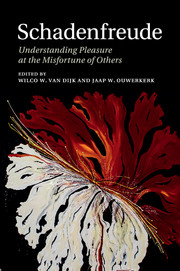Book contents
- Schadenfreude
- Schadenfreude
- Copyright page
- Contents
- Figures and tables
- Contributors
- 1 Introduction to schadenfreude
- Part I Schadenfreude as a justice-based emotion
- Part II Schadenfreude as a comparison-based emotion
- Part III Schadenfreude as an intergroup phenomenon
- Part IV Schadenfreude and related phenomena
- Part V Schadenfreude in society, language, and literature
- Index
Part I - Schadenfreude as a justice-based emotion
Published online by Cambridge University Press: 05 August 2014
- Schadenfreude
- Schadenfreude
- Copyright page
- Contents
- Figures and tables
- Contributors
- 1 Introduction to schadenfreude
- Part I Schadenfreude as a justice-based emotion
- Part II Schadenfreude as a comparison-based emotion
- Part III Schadenfreude as an intergroup phenomenon
- Part IV Schadenfreude and related phenomena
- Part V Schadenfreude in society, language, and literature
- Index
Summary

- Type
- Chapter
- Information
- SchadenfreudeUnderstanding Pleasure at the Misfortune of Others, pp. 15 - 74Publisher: Cambridge University PressPrint publication year: 2014



